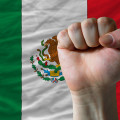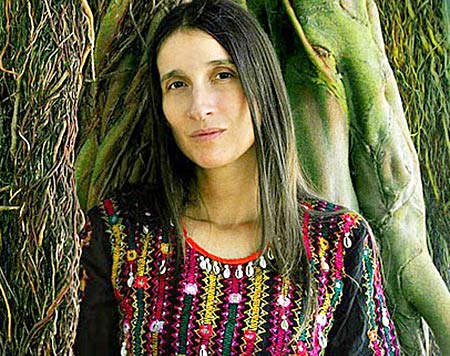
Simply because our favorite Florecita Rockera is now a mother of two doesn’t mean she’s lost her edge or her energy. Andrea Echeverri, the tattooed, pierced, and iconic frontwoman of Aterciopelados—the Colombian rock band that rose to stardom in the late 90’s with their unapologetic lyrics about political corruption, machismo, and environmental decay—is still putting the alternative in Latin music.
After giving birth to her daughter Milagros in 2002, she stated publicly that becoming a mother was a powerful experience for her, both physically and emotionally. Inspired by her personal experiences as both lover and mother, in 2005 she released her first eponymously titled solo album that went to the heart of all the organically psychedelic sensations she was undergoing. It was sensual, fecund, moody, and deliriously joyful, and in true Echeverri fashion, it never shied away from telling it like it is. No matter how uncomfortable it may have made her male fans.
Read Related: 5 Things You May Not Know About Emilio & Gloria Estefan
Since then, she’s found time during her globe-trotting concert schedule to give birth to a boy named Jacinto, an Aterciopelado album called Rio, and her second solo album, Andrea Echeverri: Dos. Always the non-conformist, this time she recorded her latest album right at home, with vocals by her mother and husband, and cover art by her daughter. As fun and easy as she makes it look, Echeverri has had to fine tune her lifestyle. She talks to Mamiverse about what this whole motherhood adventure has been like for her, while offering a high priestess’ words of wisdom for other working mothers and artists out there.
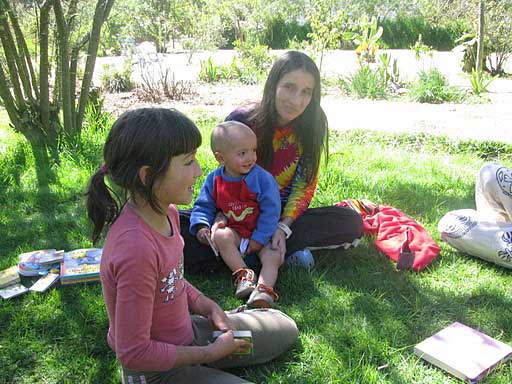
Andrea Echeverri spends quality time with Milagros and Jacinto.
Mamiverse: Can you tell us about the moment you knew you were ready to be a mother?
Echeverri: On one end, my biological clock began to tick a little louder, and then on a Yage trip, an angel (that could have very well been myself) told me that I should have a baby.
Mamiverse: You were 37 when you had Milagros, and 44 when you had Jacinto. What are the advantages and disadvantages of having a child at a more mature age?
Echeverri: The advantages are that you had time to come into your own, to work and dedicate all of your time to your life’s project (becoming an economically independent artist), to let your hair down and go wild. The disadvantage is that your body isn’t what it was in your twenties; my pregnancies were tough, the second one especially. After 40, you’re automatically placed in a high risk group, and they brainwash you about all the risks (among them that your child is born with Down syndrome) and tests you have to take… It affected me.
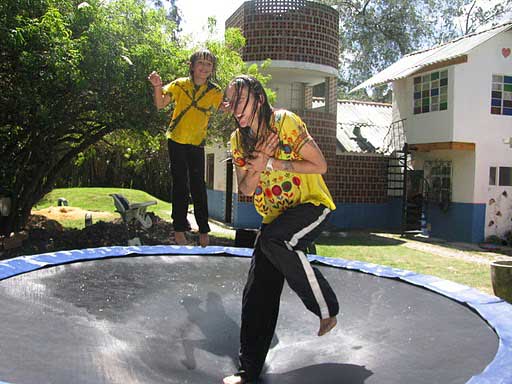
Mami-daughter time for Andrea Echeverri and Milagros.
Mamiverse: Did you have a natural child birth? Was it all that you imagined, and feared, and more?
Echeverri: Both the births were vaginal, but in a hospital. Each one was different, painful, beautiful, intense, wonderful, and rough. I hate hospitals, but the anesthesia they gave me during a moment of intense pain was a blessing. At the same time, the hospital system has its rigidness, its intrusiveness.
Mamiverse: Do you see the world differently now that you’re a mother? Did it change your relationship with your own mom?
Echeverri: Totally, for both. Being a mother means you are no longer alone, and that you will never think about yourself first. You now have a compass and a motor, but you also have to turn yourself into a witch or an Elastic Girl clone on occasion in order to manage your family and professional life. Things get better with your mother, without a doubt. First because you need their help, and second because you begin to understand and appreciate a lot of things that may have bothered you before.
Mamiverse: Now that you have two children, what has changed about the way you record albums and go on concert tours?
Echeverri: It varies day to day. I feel the pressure to work and the pains of having to leave them so that the demands from these two worlds tear me apart. I still haven’t found a balanced way of being a mother and musician, but I’m searching for it. My new album (Dos) was recorded at home, by me. And I approached it with a recreational attitude that included my family, and that was far away from the industry’s standards of perfection, but closer to my own family-musical-domestic lifestyle. I think it’s a first step.
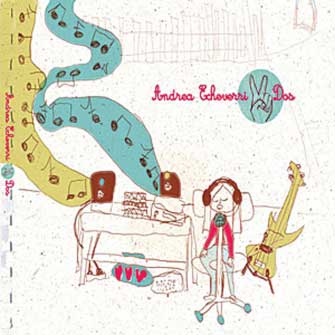
Echeverri’s DOS Cover Art drawn by Milagros.
Mamiverse: What music do you and your family listen to when you’re together? Does each have their preference or are they similar?
Echeverri: Like in any family, it’s difficult to find things that everyone likes. Although there are exceptions: We all like Drexler and Johansen, Fransica Valenzuela, Café Tacuba and Gustavo Cerati. My daughter likes my music, but she gets hooked on one album in particular and drives me nuts when I have to listen to her play El Dorado or La Pipa de la Paz albums like ten times in a row.
Mamiverse: What do you wish for your children? How do you support their interests, creative sides and that sort of thing?
Echeverri: I try not to pressure them in any one direction so that they can find what’s inside of them on their own. We draw, watch films, and read a lot together. Mi gorda (her daughter) started taking some pseudo music classes recently where she’s part of a band and they make up songs.
Mamiverse: What was your favorite “mami moment?”
Echeverri: Breastfeeding was an amazing act. And I love it when my little boy (Jacinto) hugs my legs.
Mamiverse: Do you have any tips to offer working moms about balancing one’s relationship, family and career?
Echeverri: It’s this generation’s challenge, and ways to do it are still being discovered or are under-construction. I think the most complicated part is all the domestic work that’s not paid or rewarded and that has traditionally been done by women. You have to talk with your partner, balance things out, and ask for help. Feminism has to be maintained, as should all the struggles for recognition that have yet to be resolved.
Mamiverse: Advice for a new mother?
Echeverri: Listen to your heart. Contrary to what you believe, you have all the strength that’s needed.



